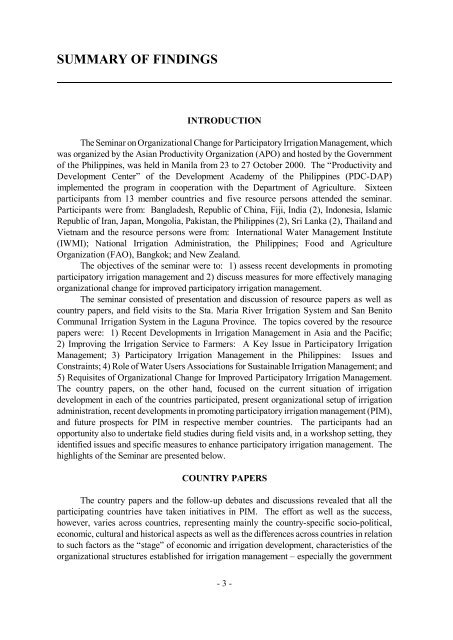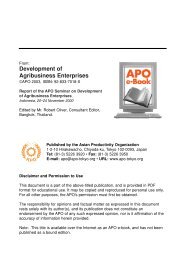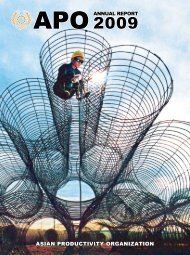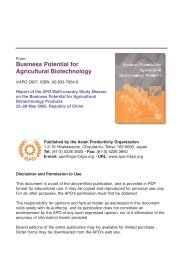Organizational Change for Participatory Irrigation Management
Organizational Change for Participatory Irrigation Management
Organizational Change for Participatory Irrigation Management
Create successful ePaper yourself
Turn your PDF publications into a flip-book with our unique Google optimized e-Paper software.
SUMMARY OF FINDINGS<br />
INTRODUCTION<br />
The Seminar on <strong>Organizational</strong> <strong>Change</strong> <strong>for</strong> <strong>Participatory</strong> <strong>Irrigation</strong> <strong>Management</strong>, which<br />
was organized by the Asian Productivity Organization (APO) and hosted by the Government<br />
of the Philippines, was held in Manila from 23 to 27 October 2000. The “Productivity and<br />
Development Center” of the Development Academy of the Philippines (PDC-DAP)<br />
implemented the program in cooperation with the Department of Agriculture. Sixteen<br />
participants from 13 member countries and five resource persons attended the seminar.<br />
Participants were from: Bangladesh, Republic of China, Fiji, India (2), Indonesia, Islamic<br />
Republic of Iran, Japan, Mongolia, Pakistan, the Philippines (2), Sri Lanka (2), Thailand and<br />
Vietnam and the resource persons were from: International Water <strong>Management</strong> Institute<br />
(IWMI); National <strong>Irrigation</strong> Administration, the Philippines; Food and Agriculture<br />
Organization (FAO), Bangkok; and New Zealand.<br />
The objectives of the seminar were to: 1) assess recent developments in promoting<br />
participatory irrigation management and 2) discuss measures <strong>for</strong> more effectively managing<br />
organizational change <strong>for</strong> improved participatory irrigation management.<br />
The seminar consisted of presentation and discussion of resource papers as well as<br />
country papers, and field visits to the Sta. Maria River <strong>Irrigation</strong> System and San Benito<br />
Communal <strong>Irrigation</strong> System in the Laguna Province. The topics covered by the resource<br />
papers were: 1) Recent Developments in <strong>Irrigation</strong> <strong>Management</strong> in Asia and the Pacific;<br />
2) Improving the <strong>Irrigation</strong> Service to Farmers: A Key Issue in <strong>Participatory</strong> <strong>Irrigation</strong><br />
<strong>Management</strong>; 3) <strong>Participatory</strong> <strong>Irrigation</strong> <strong>Management</strong> in the Philippines: Issues and<br />
Constraints; 4) Role of Water Users Associations <strong>for</strong> Sustainable <strong>Irrigation</strong> <strong>Management</strong>; and<br />
5) Requisites of <strong>Organizational</strong> <strong>Change</strong> <strong>for</strong> Improved <strong>Participatory</strong> <strong>Irrigation</strong> <strong>Management</strong>.<br />
The country papers, on the other hand, focused on the current situation of irrigation<br />
development in each of the countries participated, present organizational setup of irrigation<br />
administration, recent developments in promoting participatory irrigation management (PIM),<br />
and future prospects <strong>for</strong> PIM in respective member countries. The participants had an<br />
opportunity also to undertake field studies during field visits and, in a workshop setting, they<br />
identified issues and specific measures to enhance participatory irrigation management. The<br />
highlights of the Seminar are presented below.<br />
COUNTRY PAPERS<br />
The country papers and the follow-up debates and discussions revealed that all the<br />
participating countries have taken initiatives in PIM. The ef<strong>for</strong>t as well as the success,<br />
however, varies across countries, representing mainly the country-specific socio-political,<br />
economic, cultural and historical aspects as well as the differences across countries in relation<br />
to such factors as the “stage” of economic and irrigation development, characteristics of the<br />
organizational structures established <strong>for</strong> irrigation management – especially the government<br />
- 3 -
















